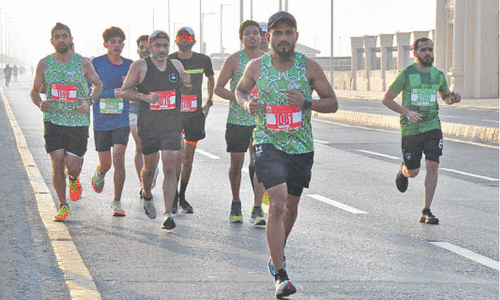BEIJING, July 29: Before the first competitor moved into action at the Athens Olympics, host Greece’s two top sprinters were facing expulsion over missing a doping test.
Four years on, China will be seeking to avoid a repeat of the embarrassing drugs scandals that have become a regular feature of sports competitions.
The sheer volume of drug tests will be higher than ever, new technologies are in place and the International Olympic Committee (IOC) has promised that the anti-doping regime at the 2008 Games which start next week will be the toughest yet.
But with pride, glory and huge amounts of money at stake, drug cheats too are stepping up their game.
“In the world of doping, for those who do it, it is a constant cat-and-mouse game,” said David Baron, chair of the department of psychiatry at Temple University in Philadelphia.
“It’s not just a pee-patrol, it’s about fair competition and healthy athletes,” said Baron, who has served as a doping control officer at past Games.
When the curtain closes on Beijing some 4,500 tests will have been conducted, a 25 per cent increase on Athens, with the top five athletes and two random finishers in every competition undergoing tests.
For the first time, kits will be available to test for the banned human growth hormone (HGH) and under an IOC regulation passed in June, anyone found guilty of a serious doping infraction will miss out on the 2012 Games in London.
“In terms of what the technicians have done and the roles in relations to anti-doping, they are stronger than ever,” said David Howman, director-general of the World Anti-Doping Agency (WADA).
But despite an ever-evolving regime to test cheats, the fight against doping has suffered blows in recent years after high-profile scandals involving cycling’s Tour de France and disgraced American sprinter Marion Jones.
Chinese sports officials have repeatedly said they would rather win no gold medals in Beijing than suffer the embarrassment of a single positive test.
But the country’s own record shows both the progress and failures in the fight against doping.
The number of domestic tests in China has risen hugely from 165 in 1990 to 10,238 last year, according to China’s Olympic Committee.
It has also tightened regulations following a series of scandals in the 1990s that marred the reputation of its athletes.
In 1994, China was stripped of nine of its 23 gold medals at the Asian Games after positive tests. In 1998, four Chinese swimmers failed pre-competition tests for triamterene, a diuretic, before the world championships in Perth.
Another swimmer, Yuan Yuan, and her coach Zhou Zhewen were caught with 13 vials of the muscle-building HGH at Sydney airport.
Athletics coach Ma Junren and his “Ma’s family army” of middle and long-distance runners also sparked suspicion when they came from nowhere to shatter a series of world records.
Ma said his athletes used only traditional Chinese tonics, but he and six of his runners were dropped from the team for the 2000 Games in Sydney after blood tests showed abnormal results.
More recently, China has enacted punishment guidelines that are far tougher than the WADA code, handing out life bans for athletes and their coaches for positive drug tests.
WADA rules mete out a two-year ban for a first offence and a life ban on the second.
Top leaders have also been making statements on the issue, indicating its importance in a Games that China wants to be perfect.
Vice-president Xi Jinping, charged with overseeing the last few months of Olympics preparations, said China must take an “attitude of zero tolerance on doping and perfect the work of doping tests.”
China had to “safeguard the purity and cleanliness of Olympic sports grounds in order to provide a fair competition environment for athletes.”
WADA agreed China’s regime was improving.
“They’ve listened to our guidance, they’ve taken heed of it, they’ve implemented an approach which we think puts their national programme in the right position,” said Howman.
Still, China was late to the game of anti-doping codes, only enacting rules specifying criminal penalties for serious offenders in 2004.
The country was also identified as the source of much of the raw materials used to make steroids after a US Justice Department crackdown last year.
In the last month it has banned two athletes for life for doping — top backstroke swimmer Ouyang Kunpeng and wrestler Luo Meng, along with their coaches.
“China is making a statement of no tolerance,” said Baron.
“I think they are very much embarrassed. They want people to see that Chinese athletes are winning gold medals because of their training and talent.”
But analysts say that with the amount of money at stake, both for athletes and local teams and trainers, the incentive remains for competitors to cheat.
“I think sport has moved from being a leisure pastime into being a growth industry,” said Howman.
“You will not return to the old values of the Olympic Games in the 19th and early part of the 20th century,” he said. “That’s just impossible.”—Reuters












































Dear visitor, the comments section is undergoing an overhaul and will return soon.